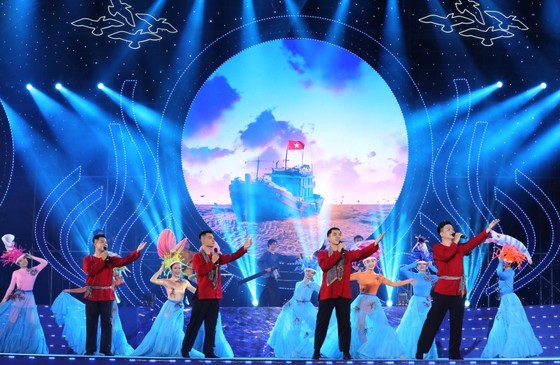The HCMC People’s Committee has just approved a project on developing HCMC’s cultural industry until 2030.

The Ministry of Culture, Sports and Tourism recognizes the annual Nghinh Ong (Whale Worshiping) Festival held in Can Gio District in HCMC as a National Intangible Cultural Heritage in 2013. (Photo: SGGP)
The project focuses on building key cultural products of the city, effectively exploiting the economic potential of culture, strengthening creativity and innovation, and enhancing competitiveness in international economic integration.
National and regional cultural industry center
The development of the cultural industry is now becoming an urgent requirement in the cause of building and developing culture at present. Many countries have developed the cultural industry on a professional level, especially developed nations that applied a cultural mode to pave the way for economic activities. The cultural industry is a fast-growing sector and attracts a lot of attention from countries. It is regarded as a breakthrough field in the national development strategy.
Under the project on developing HCMC’s cultural industry until 2030, the southern metropolis will be developed into a center for cultural industry of the country and region in the 2021-2025 period.
The project also focuses on investing resources, encouraging socialization, and developing the areas that have advantages and many values contributing to the city’s Gross regional domestic product (GRDP), such as advertisement, fashion, exhibition, movie, cultural tourism as well as developing performing arts, photography, and exhibition into important service industries to controbute to the city’s socioeconomic development actively and effectively.
The 13th National Party Congress emphasized “urgent implementation and key development of the cultural industry and services on the basis of identifying and promoting the soft power of Vietnamese culture.
In the 2026-2030 period, the project aims to synchronously develop diversified and modern cultural industries in the city in a sustainable manner with high-tech applications, and build HCMC into a cultural industry center of Southeast Asia. Cultural services and products of the city will become regional and globally recognizable brands meeting the standards of developed countries and deeply participate in the value chain of cultural products and services in the regional and international markets.
The project will also create favorable conditions to attract resources from businesses and societies at home and abroad, build a market for cultural products and services, develop groups of quality cultural services, connect assemblages and networks in the cultural industry through database integration to link organizations, individuals and public forces of the city.
Improving mechanisms and policies

A traditional music performance (Photo: SGGP)
HCMC currently has 17,670 businesses operating in the cultural sector, accounting for 7.74 percent of the total number of enterprises in the city.
In 2010, the production value of the city’s cultural industries reached more than VND36,094 billion (US$1.47 billion), reached over VND84,123 billion in 2019 and achieved VND77,135 billion in 2020 despite the difficulties caused by the Covid-19 pandemic.
The contribution of cultural industry production to the city's GRDP reached 3.77 percent in 2010 and 3.88 percent in 2019, of which the advertising industry has the largest contribution rate.
In 2020, the production value of the city’s cultural industry saw a low growth and gained VND36,732 billion, accounting for 3.54 percent of the city's GRDP due to the pandemic but was still higher than the country's GDP target of 3 percent
The project also focuses on the construction, supplementation, and completion of policies and mechanisms related to the development of modern infrastructure and technology; issuance of specific mechanisms for businesses who seek sustainable and long-term investment.
According to Deputy Director of the HCMC Department of Culture and Sports Nguyen Thi Thanh Thuy, the city needs to pay attention to the construction of an ecosystem in the fields of cultural industry, and an appropriate distribution strategy of products to enhance revenue from performing arts and cinema activities.
Chairwoman of the HCMC Cinematography Association Duong Cam Thuy said that the southern metropolis must promote and export literary and artistic works to international markets.
By Hong Duong – Translated by Kim Khanh